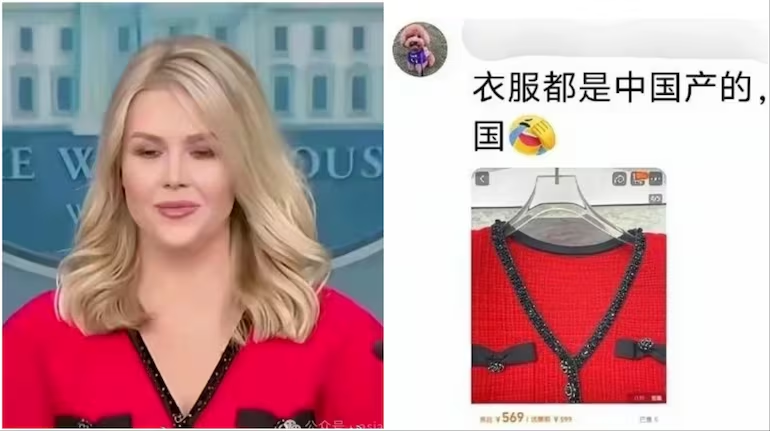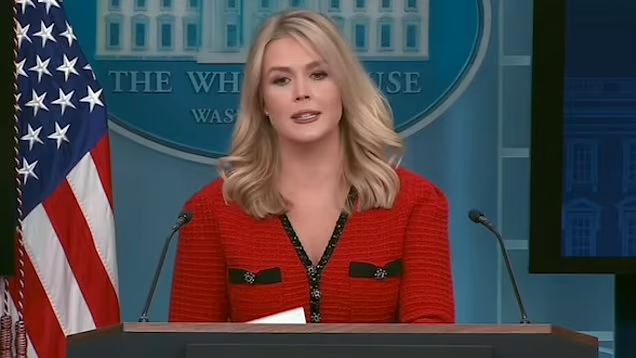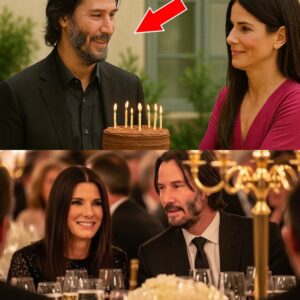A seemingly innocuous fashion choice by White House Press Secretary Karoline Leavitt has ignited a firestorm of online debate, amplifying tensions in the escalating U.S.-China trade war. During a Friday briefing, Leavitt wore a red and black lace dress that social media users swiftly alleged was manufactured in China, prompting accusations of hypocrisy given the Trump administration’s aggressive tariffs on Chinese goods. While the dress’s origin remains unconfirmed, the controversy has transformed a wardrobe moment into a symbol of the broader economic and political clash between the world’s two largest economies, with implications for trade policy and public perception.
The incident, first reported by outlets like The Financial Express and Moneycontrol, unfolded as Leavitt defended President Donald Trump’s trade strategy, which includes a 145% tariff on Chinese imports, countered by China’s 125% duties on U.S. goods. The timing—days after a 600-point Dow plunge tied to tariff fears—made the dress a lightning rod for critics and defenders alike. From X to Weibo, the story has gone viral, exposing the complexities of global supply chains and the potency of social media in shaping narratives during a volatile trade dispute.
A Dress Becomes a Flashpoint
The controversy erupted when a Chinese diplomat, Zhang Zhisheng, Consul General in Denpasar, Indonesia, posted on X, claiming the lace on Leavitt’s dress was woven in Mabu, China. Sharing a screenshot from a Weibo user who identified the fabric, Zhang wrote, “Accusing China is business. Buying China is life.” The post, amplified by accounts like ShanghaiPanda, who quipped, “Blaming Made in China is her job, enjoying Made in China is her life,” racked up thousands of shares, framing Leavitt as a hypocrite for wearing Chinese goods while championing protectionism.

Social media sleuths pointed to listings on Chinese e-commerce platforms like Taobao, where a similar red and black lace dress retailed for as little as $30, far below Western designer prices. “Leavitt slams Made in China while rocking a Chinese-made dress—hypocrisy much?” wrote X user Richard Angwin, reflecting a sentiment echoed across platforms. Others noted that Trump’s “Make America Great Again” merchandise, produced in China since 2016, undercut the administration’s rhetoric, adding fuel to the fire.
Leavitt’s defenders pushed back, arguing the dress might be a French original, with Chinese sites selling knockoffs. “Fake news. She’s wearing the French original, whereas the advert shows a Chinese copy,” posted X user Victor The Cleaner, a claim echoed by actor Matthew Marsden, who suggested, “China steals everything. Probably a copy.” The White House declined to confirm the dress’s origin, with a spokesperson calling the uproar a “distraction” from trade negotiations. Without a label check, the truth remains elusive, but the debate has transcended facts, becoming a proxy for deeper grievances.
Trade War Context Intensifies Scrutiny
The dress saga lands amid a bruising U.S.-China trade war, reignited by Trump’s tariffs. On April 8, he imposed 145% duties on Chinese imports, prompting China’s 125% retaliation, up from 84%, effective Saturday. The tit-for-tat has rattled markets—Tesla suspended Model S orders in China, and oil prices dipped to $68 a barrel on recession fears. A 90-day tariff pause on 75 other nations, announced Tuesday, eased some pressure, but China remains the focal point, with Leavitt asserting Trump’s “spine of steel” in talks.
Leavitt, the youngest press secretary at 27, has been a vocal tariff advocate, accusing China of “ripping off American workers for decades” on Fox News’ The Story. Her April 11 briefing, alongside Treasury Secretary Scott Bessent, touted “75 countries” seeking trade deals, framing Trump’s policy as a triumph. Yet, the dress allegations undercut her message, with critics like X user NerdTech noting, “Trump’s team can’t escape China’s reach, from MAGA hats to Karoline’s wardrobe.” The irony is stark: global supply chains, especially in fashion, rely heavily on Chinese manufacturing, with 38% of U.S. apparel imports sourced there in 2023, per the Commerce Department.
China’s state media seized the moment. A CCTV segment highlighted Leavitt’s dress as proof of U.S. dependence on Chinese goods, while Weibo users mocked Trump’s tariffs as “performative.” “They slap tariffs, but their closets are Made in China,” one post read, reflecting Beijing’s narrative that U.S. policy is more bluster than substance. The Chinese Commerce Ministry, without naming Leavitt, called tariffs “self-destructive,” citing a 4.2% inflation spike risk flagged by Goldman Sachs.
Fashion as Political Fodder
Leavitt’s dress isn’t the first fashion controversy to roil politics. Melania Trump’s 2018 “I Really Don’t Care” jacket sparked outrage, and Nancy Pelosi’s orange coat drew memes. But Leavitt’s case, tied to trade, hits harder. “Fashion’s a minefield for public figures,” said media scholar Ellen Carver. “A dress becomes a billboard for your contradictions.” Leavitt, a New Hampshire native and Catholic mother, has cultivated a polished image, often in tailored outfits signaling authority. Her choice—a bold, lacy design—fit her style but invited scrutiny in a hyper-polarized climate.
The online reaction splits along predictable lines. Trump supporters, like those on Truth Social, dismissed the uproar as “liberal nonsense,” urging focus on jobs, not dresses. Critics, from Reddit to TikTok, see it as emblematic of GOP double standards. “Tariffs for thee, but not for me,” one TikTok captioned, overlaying Leavitt’s briefing with Taobao screenshots. A Morning Consult poll shows 49% of Americans view Trump’s tariffs skeptically, with 62% worried about price hikes—sentiments the dress debate amplifies.
Economic and Diplomatic Stakes
The controversy underscores the trade war’s complexity. Apparel, a $80 billion U.S. import sector, faces 20–30% price hikes if tariffs persist, per the American Apparel & Footwear Association. Retailers like Walmart warn of consumer pain, while small businesses, reliant on cheap Chinese inputs, brace for losses. “Nobody escapes globalization,” said economist Paul Dermot. “Leavitt’s dress, real or not, shows how tangled the web is.” Even if French-designed, its lace likely passed through Chinese factories, a nod to China’s textile dominance.
Diplomatically, the spat risks escalation. Zhang’s post, though playful, carries weight—China’s diplomats rarely engage in public trolling. “It’s a soft power jab,” said analyst Clara Torres. “Beijing’s saying, ‘You need us more than you admit.’” Trump’s team, eyeing talks with Xi Jinping, must navigate the optics. Leavitt’s April 13 claim that Trump is “optimistic” about a deal clashes with Xi’s CCTV vow that China “won’t bend.” A stalled tariff pause, ending July 8, could spike duties further, with Leavitt’s dress as a lingering meme.
What’s Next?
The White House has pivoted, with Leavitt focusing on jobs—200,000 added in March, per her briefings—while dodging dress queries. But the story persists, with 10 million X impressions by Monday, per analytics firm Sprout Social. “It’s a distraction, but it sticks,” Carver said. “Voters remember symbols.” Democrats, like Rep. Hakeem Jeffries, have pounced, tweeting, “Tariffs raise prices, but apparently not for MAGA wardrobes.” Republicans, wary of alienating moderates, urge restraint, with Sen. Mike Rounds calling it “a sideshow.”

For Leavitt, the episode is a lesson in scrutiny. Her assertive style—honed as Trump’s 2024 campaign aide—thrives in combative briefings, but personal choices now draw equal fire. “She’s a target because she’s effective,” said GOP strategist Tomi Lahren. Yet, with 46% approval for Trump’s trade policy, per YouGov, the dress risks denting credibility. As tariffs loom, and prices tick up—gas at $3.02, groceries 5% higher than 2024—the administration can’t afford missteps.
The dress, real or knockoff, is a microcosm of trade’s tangled reality. Leavitt’s next briefing, set for Wednesday, will likely face fresh questions—not just on policy, but on what she wears. In a war of tariffs and tweets, even fashion becomes a battleground, proving no detail is too small to spark a global storm.





